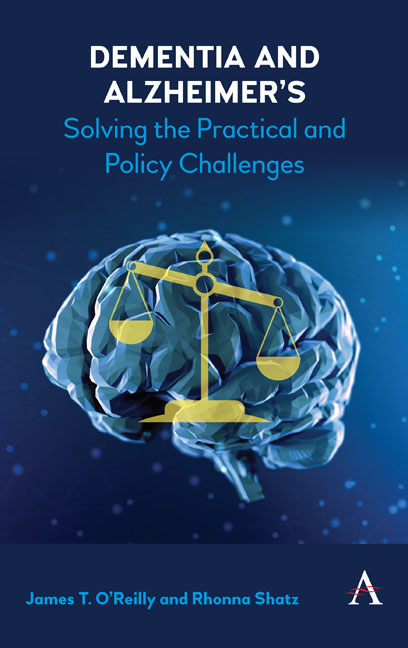Book contents
- Frontmatter
- Contents
- 1 Introduction
- 2 The family dynamics of dementia
- 3 Tort liability related to dementia
- 4 Dementia and private insurance
- 5 Medicare, Medicaid, disability and other government benefits
- 6 Dementia and residential care facilities
- 7 Adult protective services in dementia cases
- 8 Dementia and financial issues
- 9 Dementia in probate and guardianship
- 10 Dementia and employment issues
- 11 Drug research and new product developments for dementia
- 12 Dementia and criminal justice
- 13 Understanding your expert's advice about brain deterioration
- 14 Understanding the causes of Alzheimer's disease
- Appendix: Finding medical reference sources about dementia
- Index
12 - Dementia and criminal justice
- Frontmatter
- Contents
- 1 Introduction
- 2 The family dynamics of dementia
- 3 Tort liability related to dementia
- 4 Dementia and private insurance
- 5 Medicare, Medicaid, disability and other government benefits
- 6 Dementia and residential care facilities
- 7 Adult protective services in dementia cases
- 8 Dementia and financial issues
- 9 Dementia in probate and guardianship
- 10 Dementia and employment issues
- 11 Drug research and new product developments for dementia
- 12 Dementia and criminal justice
- 13 Understanding your expert's advice about brain deterioration
- 14 Understanding the causes of Alzheimer's disease
- Appendix: Finding medical reference sources about dementia
- Index
Summary
Overview
This chapter addresses dementia in the context of criminal behavior by, or directed toward, the person with dementia. It is likely that the individual would be said to be “looking normal,” because it is not easily detected or immediately discernable that an individual person's mental condition was the product of the degenerative brain conditions which are collectively known as dementia.
Unlike an inability to walk or an inability to see objects, dementia in a patient is not perceptible by the average person under normal circumstances. The brain's degenerative condition which makes the person less able to control their actions may lead to a confirmed diagnosis of frontotemporal dementia after neuropsychological tests and/or expensive and complex brain scans are performed. Many studies have been offered and debated on this issue.
It is possible that a defendant between ages 40 and 70 might claim that her or his conduct was the result of early onset dementia. This can be determined by standard forensic psychological assessment testing. It may be augmented by electronic CT or MRI brain scanning and evaluation of brain plaque conditions. Not all dementia claims are valid, of course. “Other problems that may be mistakenly labeled dementia include delirium, psychosis, depression, and the side effects of various medications.”
But it would be rare for a criminal defendant to have solid, persuasive factual brain imaging diagnostic data that would survive critical cross-examination. A claim of mental disease or defect may be attempted, but to the extent that the claims reflect alcoholism, drug use or other transitory impairment of consciousness about behavior, the dementia claim is unlikely to be successful.
The defense case against a criminal charge requires expert witnesses who would testify about their examination of the defendant. Then they would testify that for a patient with frontotemporal dementia, the brain is losing “filters” of sound, prudent judgment. So the loss of inhibitions and scrambled reasoning is a problem that may involve the uninhibited patient in criminal incidents, as actor or victim. The patient is missing the normal social inhibition against doing an action that would be adverse, and their brain is not presently aware that it is wrong to do that action.
- Type
- Chapter
- Information
- Dementia and Alzheimer'sSolving the Practical and Policy Challenges, pp. 85 - 100Publisher: Anthem PressPrint publication year: 2019



